My name is Lianne, and I am an avid reader. When asked what I read, I usually say ‘words on a page’, since I will read just about anything. Fiction, non-fiction, literary, genre, graphic novels. Really, the only things I’m not crazy about (although I will read examples once in a blue moon) are romance, westerns, and hard-boiled detective novels.
The lazy hazy days of summer

A while back I decided to try to increase the number of books in translation that I read, and especially non-European books.
The Hole by Hiroko Oyamada is a book in that category (and also a tick on my Book Riot Read Harder 2021 checklist, not that I expect to completely fill that card).
Asa has a boring job for a company where she is not a permanent employee. Then her husband gets transferred to a different office, and they need to move. The new office is closer to his parents, who have an empty rental next door to their own home, which they offer, rent-free.
They move in during the hot part of the summer, and Asa must settle in as a housewife, something she hadn’t been up until then. And strange things are happening. She sees a strange creature, and when she follows it, she falls into a hole just big enough to hold her, standing up with her head above ground. There are strange children at the corner convenience store. She meets a man who claims to be her husband’s brother, and that he lives in her in-laws’ shed.
Is all of this real, or is she going crazy?
There isn’t much of a plot to the story, it’s more of a character and environment study. You can feel the summer heat, hear the sound of cicadas in the fields. The environment reminds me of watching My Neighbour Totoro for the first time. It’s the sort of book that should be read in a hammock during the dog days of summer, with a glass of lemonade.
Moon Landing Conspiracies!
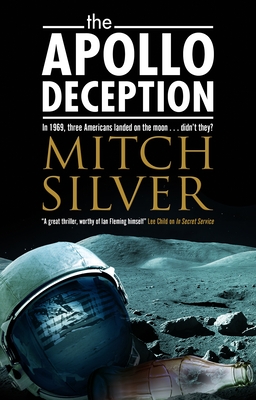
What if we landed on the moon, just.. you know.. not Apollo 11? That’s the basis of The Apollo Deception by Mitch Silver
Facing deadlines after the Apollo 1 disaster, where three astronauts died on the launchpad during a test, NASA resorts to trickery. They fake the Apollo 11 moon landing. Okay, that was the only one they faked; all the other moon missions actually did go ahead, and did land. Just not the most famous one.
Now the Chinese are planning to land Taikonauts on the moon and plant the Chinese flag right next to the one that Armstrong planted. The one that isn’t actually there. What to do.
After the death of his father, Gary finds a set of film reels in the man’s storage. Film that proves that the first moon landing was faked. And someone wants those film reels, no matter what they have to do to get them. This leads to a race to the moon, between the Chinese (who don’t realize that there is a race), and the US (to secretly fake everything that people think they know about the moon landing, right down to the placement of airsick bags). And not everyone on the secret mission can be trusted.
And Gary is stuck in the middle.
Knocking off the dust…
Well, it’s been.. a while. In fact, we are looking at the start of Pandemic. I spent the summer mostly rereading old favorites, while binging (to my detriment) on cable news. And now there is an American election on top of that (at least we’ve ducked that bullet up here, North of 49).
This weekend is the Dewey 24 hour Readathon, and while last time (in the spring) I just worked to read a few pages every hour, this time I am diving in. And I have a large pile of books that I will be pulling my reads from.
Because it’s Halloween in a week (no trick or treating this year, since I live in a red zone, which also made for a very solitary Thanksgiving), my selections all fall into the category of creepy, whether horror, murder, or psychological. I plan to read at least two library books (they really need to be returned soon).
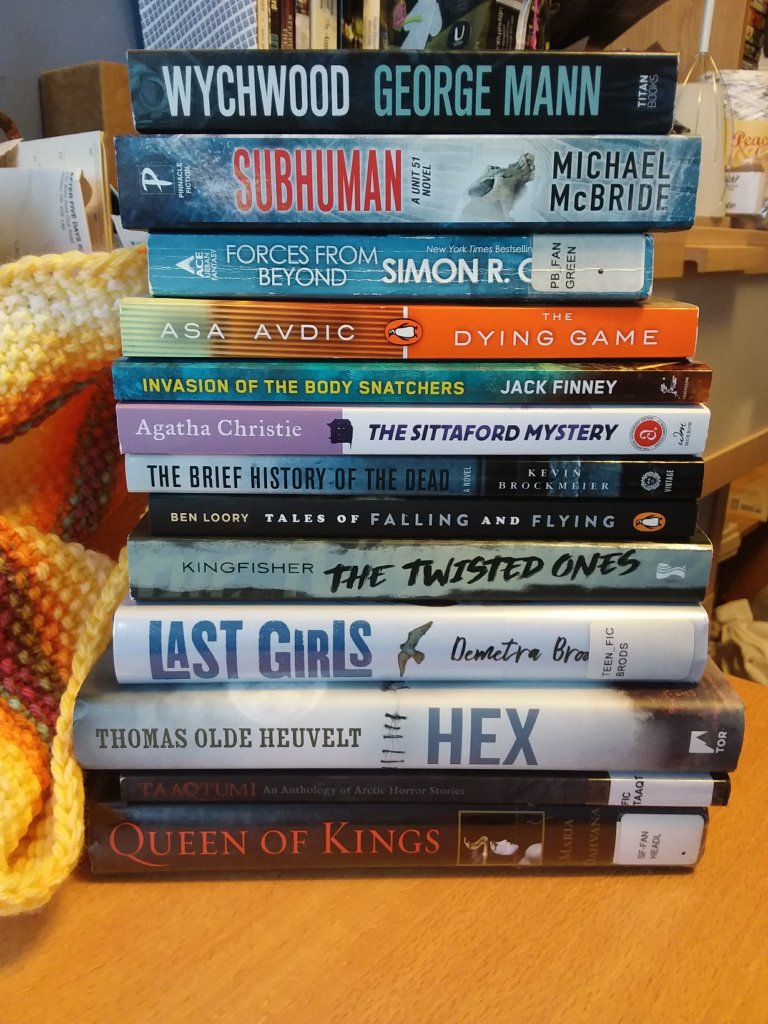
So have a happy Halloween, all, and here’s hoping that by Christmas it will be safe to spend time with our extended families.

Books that reflect current fears
This isn’t really a book review, but with the current extreme measures over Covid-19, it made me think of similar fictional pandemics.
 Strangely, I’m going to start with… Tom Clancy. In his Jack Ryan novel Executive Orders. In this volume, after Jack Ryan becomes president in an incident that people compared to 9/11 (a pilot hits the Capitol with his passenger plan when the president was announcing Jack Ryan as the new vice-president, leaving Jack Ryan as president in charge of a demolishe government), a middle-eastern non-existent country decides to unleash a weaponized Ebola virus on the US while it’s trying to pull itself together. As a result, President Ryan is forced to institute a nation-wide quarantine, shutting down all gatherings and inter-state traffic. In doing so, he was calm and reassuring in the face of virulent objections, and saved a lot of people as a result.
Strangely, I’m going to start with… Tom Clancy. In his Jack Ryan novel Executive Orders. In this volume, after Jack Ryan becomes president in an incident that people compared to 9/11 (a pilot hits the Capitol with his passenger plan when the president was announcing Jack Ryan as the new vice-president, leaving Jack Ryan as president in charge of a demolishe government), a middle-eastern non-existent country decides to unleash a weaponized Ebola virus on the US while it’s trying to pull itself together. As a result, President Ryan is forced to institute a nation-wide quarantine, shutting down all gatherings and inter-state traffic. In doing so, he was calm and reassuring in the face of virulent objections, and saved a lot of people as a result.
Pity the current president isn’t quite so calm and reassuring, but we won’t get into politics.
I really enjoyed Executive Orders, even though I was a little peeved at the complete lack of mention of what happened in Canada. After all, the virus was unleashed in conventions, and guaranteed there were Canadians at those conventions.
Still, everything works out in the end
And then there are not so happy pandemic results.
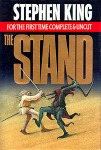 A classic, of course is The Stand, by Stephen King. A flu-like bug engineered in a US military lab is unleashed, and as a result, most of the world’s population is wiped out, leading into a supernatural battle between good and evil. I enjoyed the book, but I even more enjoyed the mini-series staring Gary Sinese. The mini-series treated women and minorities better than the book, I found.
A classic, of course is The Stand, by Stephen King. A flu-like bug engineered in a US military lab is unleashed, and as a result, most of the world’s population is wiped out, leading into a supernatural battle between good and evil. I enjoyed the book, but I even more enjoyed the mini-series staring Gary Sinese. The mini-series treated women and minorities better than the book, I found.
 A more recent example is Station Eleven, by Emily St John Mandel. Tis lovely book flips between the ‘present’ after the pandemic Georgian Flu kills a majority of the world, and a troop of Shakespearean actors are traveling to bring entertainment to isolated communities because ‘survival is not enough’, and the ‘past’ during the pandemic. It’s a little silly that so many of the characters are interconnected in the post-pandemic world, but I really enjoyed the book.
A more recent example is Station Eleven, by Emily St John Mandel. Tis lovely book flips between the ‘present’ after the pandemic Georgian Flu kills a majority of the world, and a troop of Shakespearean actors are traveling to bring entertainment to isolated communities because ‘survival is not enough’, and the ‘past’ during the pandemic. It’s a little silly that so many of the characters are interconnected in the post-pandemic world, but I really enjoyed the book.
 Finally, another book I really enjoyed was The Dog Stars by Peter Heller. In it, after (again) a Flu bug kills off the majority of humanity, two men are living in an airport, one of them an avid pilot getting in as much flying as he can before aviation flu expires (yes, apparently fuel expires). One day, while flying he picks up a signal from another airport, and he decides to go looking for more surviviors.
Finally, another book I really enjoyed was The Dog Stars by Peter Heller. In it, after (again) a Flu bug kills off the majority of humanity, two men are living in an airport, one of them an avid pilot getting in as much flying as he can before aviation flu expires (yes, apparently fuel expires). One day, while flying he picks up a signal from another airport, and he decides to go looking for more surviviors.
So, folks, stay safe and make sure not to touch your face as much as possible, and regularly wash with soap and water.
Oh, and stop hoarding toilet paper, people. It’s ridiculous.
Everyone’s favorite villains…
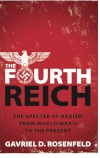
It didn’t occur to me until I read this book that while I’ve seen lots of book about the Nazis before and during the Second World War, I’ve never really read anything about Germany in the years after the war.
The Fourth Reich, by Gavriel D Rosenfeld, covers that period, and especially the fear that Nazis would try again. It looks at the conditions after the war, and the efforts to establish a new Nazi party, and to ensure that there would never be another Nazi party. It also looks at how the fears were projected into writing (both fiction and non-fiction) and film. I came out of the book with a list of other books I want to track down to read.
My only real disappointment with the book was that the description of the book included “He shows how postwar German history might have been very different without the fear of the Fourth Reich as a mobilizing idea to combat the right-wing forces that genuinely threatened the country’s democratic order”. I was a little disappointed by the lack of any speculation into what could have been.
Still, it opened my eyes to something I’d never thought about before. In my mind, WWII ended, and the Nazi’s were gone, at least until I became aware of the skinheads in the eighties. This book showed me the ways that the Nazi ideology continued to affect (or infect) post-war Germany, and how hard the German government (and the occupying countries like the US and UK) worked to make sure that fascism did not move back into power.
Here’s hoping that the current political problems around the world doesn’t mean that their efforts were in vain.
Thanks to the publisher and Netgalley for letting me read this
Lovecraft meets *Redacted*
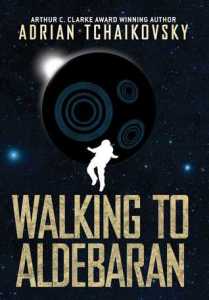 Walking to Aldebaran by Adrian Tchaikovsky is a little gem of a book. It’s actually a novella, but it’s worth the price of entry.
Walking to Aldebaran by Adrian Tchaikovsky is a little gem of a book. It’s actually a novella, but it’s worth the price of entry.
Gary Rendell is an astronaut, but he is lost and at least slightly crazed. We alternate between his present, wandering through a bizarre alien maze, encountering others, but not finding the other members of his mission, and the past, giving the lead up to the current mission.
In short, a probe to the outer reaches of the solar system found a giant and bizarre… structure (Gary calls it the face of a frog god) that seems to be fractal in layout. It swallows the probe, but the probe eventually reappears, sending readings that indicate that the structure may actually be a portal to other worlds. After much political fighting, an international mission is sent out to explore the structure. Gary is a member of the mission.
Once there, they find a half-built rocket that looks like something out of a pulp magazine, but is unimaginably ancient. a ‘landing’ party, including our protagonist, is sent down to establish a base and start exploring, which is of course when things go horribly wrong.
I will admit, I spent most of my book thinking of this book as a modern equivalent to Lovecraft. As a result, it wasn’t until the last few pages that I finally figured what classic piece this book was also a retelling of. It was that realization that bumped up my appreciation of the story. I won’t say what it was a retelling of, since I don’t want to spoil it for other people.
But I will say that if you are a fan of the cosmic horror that Lovecraft praised, you will like this book.
Thanks to the publisher and Netgalley for letting me read this
Are we really 3 weeks to the end of the year???
Pardon me as a run in circles, trying to figure out how to get everything done. But I did decided to get a seasonal manicure. (And may I say, it is difficult to take a picture of your own hand where you don’t look like you have no wrist)
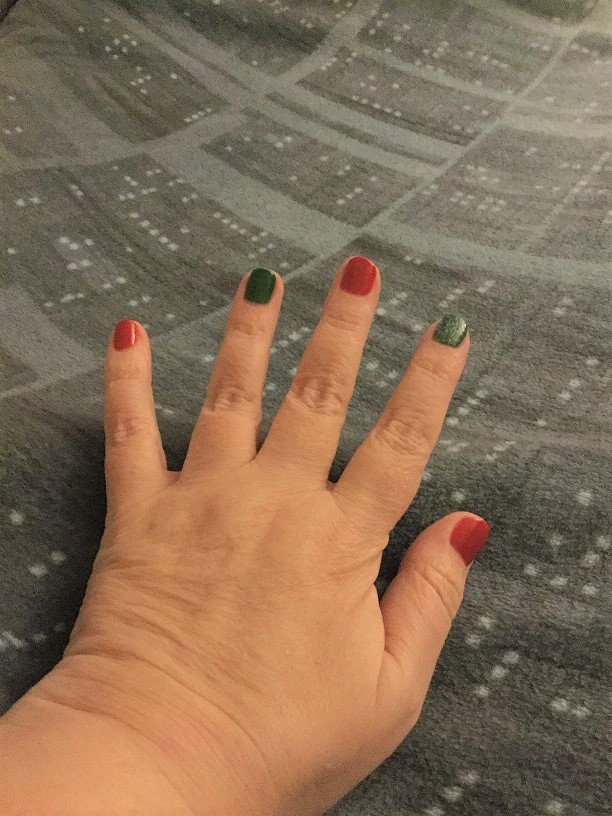
Witches and Mermaids, oh my
 It has been a long winter so far, and it has barely started. Work has been kicking my ass, and I have been trying to get my Christmas shopping done before December (mostly succeeded) because I hate crowds, so I avoid malls and shopping centers in the month of December.
It has been a long winter so far, and it has barely started. Work has been kicking my ass, and I have been trying to get my Christmas shopping done before December (mostly succeeded) because I hate crowds, so I avoid malls and shopping centers in the month of December.
One part of Christmas shopping that I enjoy, though, is getting everyone on my list a book as part of their gift. Figuring out just which book to get each person is a lot of fun.
In the meantime, while my personal reading has been curtailed, I do have some book reviews to catch up on.
In recent years, I have been trying to read more poetry. Before this, I was not aware of the concept of Instagram Poetry. The poems tend to be shorter, and the poets younger, and often female. Names like Rupi Kaur, Nikita Gill, and amanda lovelace (yes, lowercase) come up in this category. The first did not work for me, the second blew me away (and I now follow on Instagram), and now I’ve tried the third, and I have become a fan of her as well.
The collections The Witch Doesn’t Burn in This One and The Mermaid’s Voice Returns in This One are part of a series of poetry collections that examine feminist themes through. The first uses imagery from witch burnings, and the second The Little Mermaid (where the mermaid sacrificed her tail for a man who turns to someone else). They are taking the stories we grew up on and giving them a little twist for the modern era.
When I started reading this type of poetry, it took a while to get used to it. My memories of poetry in school was of longer poems with complicated rhyming schemes. Instagram poets tend to be short free verse, verging on being slogans. When well done, they can definitely provoke thought.
And being short, these books are perfect for reading a few pages before bed (or, I hate to admit it, sitting on the toilet)
Thanks to the publisher and Netgalley for letting me read The Mermaid’s voice.
Siri or SkyNet?
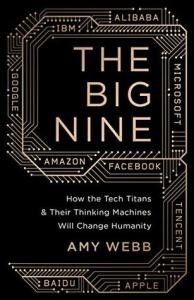
As someone who works with computers every day (my job is as a software tester), AI is a topic that I’ve kept an eye on over the years. Initially, AI was an SF trope (HAL, SkyNet, Data on Star Trek TNG), but in recent years, there’s Siri and Alexa and all the other digital assistants.
But AI is also the algorithms that decide which Google results you see, or which posts appear at the top of your Facebook feed, but those are so invisible that no one thinks about it unless there’s a news story about conservatives complaining that Facebook filters them out of people’s news feeds. Also, AI often is filtering out applications to jobs, which is even more problematic. Last year, Amazon pulled their AI filters because it was filtering out women, since the training data for the AI was based on past discriminatory hiring. If your past involves hiring mostly white men, the AI is going to start filtering out non-whites and women.
This last is one of the things that leans into this new book about AI, the companies actively working on the code, both in North America and China, and where it is going.
The Big Nine, by Amy Webb, is divided into three distinct sections.
1) The companies (and governments) working on AI. Primarily, three companies in China and six companies in North America. Ms Webb goes into the history of their work and where they are heading.
2) Issues that need to be fixed in this development. This includes the mono-cultures within the companies (their employees mainly come from the same sorts of backgrounds and schools, with a lack of training outside of coding). She points out the problems with datasets built by people who don’t think of diversity, and the need for programmers to consider things outside of their schooling, like ethics for example. The results of this ranges from the innocuous (photo tagging AIs suggesting ‘gorilla’ for a photo of an African-American face) to the problematic (digital assistants that can’t understand accents). And in the future, will someone be saying, like Ian Malcom in Jurassic Park, ‘Your scientists were so preoccupied with whether they could, they didn’t stop to think if they should’
3) In the third sections Ms Webb indulges in a thought experiment, presents three futures for AI that are ‘good’, ‘continuing on the same path’ and ‘negative’.
I will say, though, her ‘good’ scenario was to me ‘not as bad as it could be’. It was still a little unnerving as a vision of the future. But mind you, I am a software tester who doesn’t even have a cell phone, so take that for what it may be. It left me wanting to say ‘get off my lawn!’.
Thanks to the publisher and Netgalley for letting me read this
Real life can be more thrilling than a thriller…
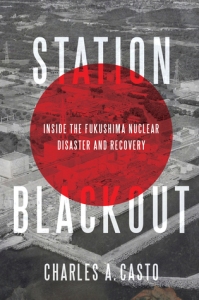 Well, it’s been a long summer, where I have been very flighty with my reading, and even more so with posting. I have been reading, however, so now it’s time to start posting reviews again. I read some fantastic books, and some pure fluff. Hey, summer is a great time for fluff.
Well, it’s been a long summer, where I have been very flighty with my reading, and even more so with posting. I have been reading, however, so now it’s time to start posting reviews again. I read some fantastic books, and some pure fluff. Hey, summer is a great time for fluff.
Station Blackout by Charles A Casto is anything but fluff. In fact, a large part of it read more like a thriller. It follows what happened in the minutes, days and months after the Fukushima Daiichi nuclear plant problems after the earthquake and tsunami in March 2011.
The timing of this book is coincidental, but for people who were pulled into the HBO miniseries Chernobyl, Station Blackout is a great read for the people who wanted more after the miniseries was over. The book sucks you in, investing you in the men and women who worked at great danger to themselves to try an avoid a disaster even greater than what happened in Chernobyl.
And around the intense story of what happened is an examination of leadership and how it can help or hinder in a crisis. These parts include things that readers can incorporate into their own lives as needed. The author clearly knows what he is talking about.
My only complaint was that after the intensity of the start of the book, the end sort of dribbles away. Mind you, that is the way real crises go. All the adrenaline is at the start, but the cleanup goes on for years, as do the investigations.
Hopefully the nuclear industry has learned from the mistakes that were made, and hopefully the real heroes are still lauded in Japan.
Trump and Foreign Policy
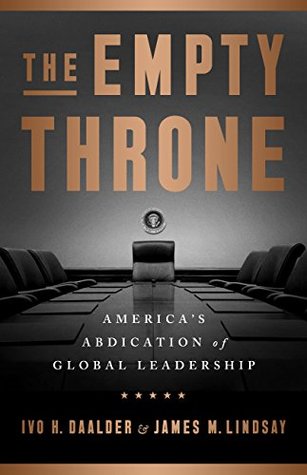 In the last couple of years, I’ve tortured myself with books about politics. Tortured through either books that look at things done well in the past, or looking at the current US president and the things he is doing completely wrong.
In the last couple of years, I’ve tortured myself with books about politics. Tortured through either books that look at things done well in the past, or looking at the current US president and the things he is doing completely wrong.
The Empty Throne, by Daadler & Lindsay, looks at foreign policy and the ways that Trump (and previous presidents to a lesser extent) have failed in that foreign policy. The Next Decade, by George Friedman, which I am just finishing, also looks at foreign policy and suggest goals for the upcoming decade (the book was written a decade ago, so he was talking about the 2010s). Somehow, I don’t think he took Trump into consideration
In both books, foreign policy is described in very pragmatic terms of playing other countries off of each other for the benefit of the US, not going for the idealistic goals of improving other countries and encouraging democracy around the world. The Empty throne then looks at Trump’s actions in relation to foreign policy, and especially his behaviour towards Russia and North Korea and Iran, as well as his hostility towards traditional allies, and Trump comes up looking very foolish, if not downright dangerous.
And the sad thing is, if the author was writing the book today, he would have even more material. He might even be able to double the length of the book.
I would definitely read a follow-up at the end of the Trump presidency, whether next year or in five years. No matter how tortuous it might be
Thanks to the publisher and Netgalley for letting me read this
How to avoid Black Holes
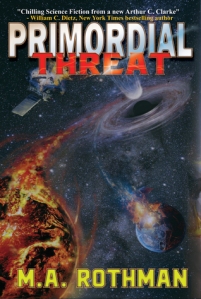 In Primordial Threat by MA Rothman it’s 2066, and scientists are just starting to realize that Earth is in terrible danger. A tiny black hole is heading into the solar system, and even if it doesn’t destroy the Earth straight up, it’s going to change conditions so drastically that it might as well have.
In Primordial Threat by MA Rothman it’s 2066, and scientists are just starting to realize that Earth is in terrible danger. A tiny black hole is heading into the solar system, and even if it doesn’t destroy the Earth straight up, it’s going to change conditions so drastically that it might as well have.
Burt Radcliffe is in charge of DefenseNet, an early warning set of satellites. In his attempt to figure out what Earth can do, he discovers that Dave Holmes, a brilliant scientist whose ideas are dismissed by most of the establishment scientific community, actually had an idea of what was coming long before everyone else, and maybe he is brilliant enough to find a solution. But he disappeared completely several years earlier.
Step one: Find Dave Holmes. Step two: Figure out if his solution will work. Step three: Figure out if his solution can actually be implemented in time.
While I found aspects of the science to be beyond belief (namely the possible solution), I did enjoy the book greatly. The side plot about a doomsday cult had me scratching my head, because I was never quite sure how they knew about this so far in advance that they could plant people in space missions that would have uncovered the danger earlier. The fact that they were determined to make sure that no solution is implemented and every will die was a little easier to accept, since people are crazy.
I wouldn’t call this book brilliant, but it was an enjoyable read, so much so that I have bought his medical SF thriller, Darwin’s Cipher, and I look forward to reading it.
Thanks to the publisher and Netgalley for letting me read this
